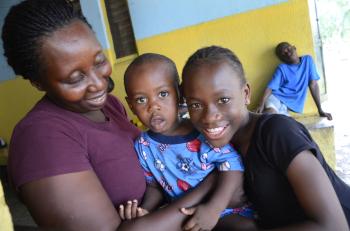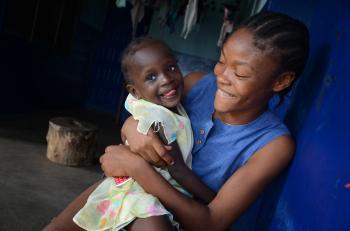HIV/AIDS rates are high in Monrovia and can lead to a descent into poverty

Monrovia – named after US President James Monroe – is the capital of Liberia and has a population of approximately one million. It is the country’s financial and administrative centre and also has an important harbour. Work to rebuild and renovate infrastructure and roads is on-going, but living conditions for the large majority remain incredibly tough.
In the last years, the Liberian government has made the “Prevention and Management of Nutrition, HIV and AIDS disorders” one of its key priorities. Although the overall HIV prevalence in the country is fairly low at 1.5 per cent, it is much higher in Monrovia, at 2.9 per cent. In women between the ages of 15 and 24, prevalence is up to three times that of men. Mother-to-child transmission therefore also continues to be a great concern. Families who are affected by the disease often cannot access treatment due to the high cost and long journeys to reach a medical centre. If they are ill and unable to work, they are increasingly at-risk of falling into abject poverty, unable to ensure a nutritious diet for themselves and their children. Stigma and discrimination towards those affected also remain predominant in Liberian society.
During the war, the SOS Children's Village Monrovia was something of a safe haven, which offered protection and help to the local population. In April 1996 and in July 2003, when fighting was at its worst in Monrovia, as many as 7,000 people sought shelter at the SOS Children's Village from the pillaging and plundering gangs. Up to 40,000 people benefited from the SOS Emergency Relief Programme and the emergency clinic, which has now been converted into the SOS Medical Centre.
The SOS Medical Centre treats up to 22,000 patients each year, providing basic health care and treatment, electrocardiography, ultrasound, vaccination services and other preventive measures, awareness and information campaigns to many who could not otherwise afford these services.
Holistic and sustainable support for all members of the community
Today, there is a great need for support within the communities of Monrovia, and children are as vulnerable as ever. Liberia’s unemployment and poverty rates have reached all-time highs. Today’s children are at great risk of growing up to be a generation of impoverished citizens.
As of 2005, the SOS Social Centre in Monrovia provides a family strengthening programme to around 1,750 beneficiaries each year, ensuring that families have access to basic education, medical care, and material assistance. In addition to running day-care centres for the children of working parents, we also offer training opportunities, such as literacy and computer courses, to help parents find income-generating activities and become self-sufficient. We also provide psychosocial support, as well as information on hygiene and nutrition. Families that are struggling to survive receive food rations for as long as they need them. The family strengthening programme has helped many families to become more stable and secure.
What we do in Monrovia

For children in Monrovia who are no longer able to live with their parents, 15 SOS families can provide a loving home for up to 150 children. In each family, the children live with their brothers and sisters, affectionately cared for by their SOS mother.
The children attend the SOS Kindergarten together with children from the neighbourhood, ensuring that they are integrated into the local community from a young age. The children then go on to attend the SOS primary and secondary schools, which are attended by around 420 pupils.
When young people move out of the SOS family home to study or find work, the SOS Youth Programme continues to support them as they make the transition into adulthood. Qualified counsellors supervise them and provide guidance.